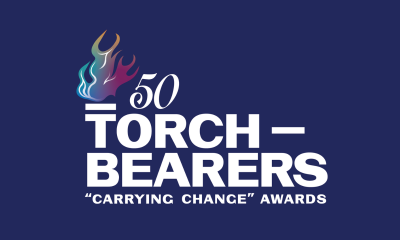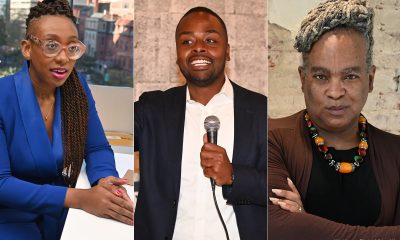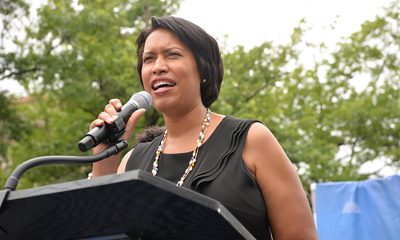Arts & Entertainment
SPOTLIGHTING LGBT HOMELESSNESS: Alston House celebrates a decade in operation
LGBT youth shelter named after slain D.C. activist
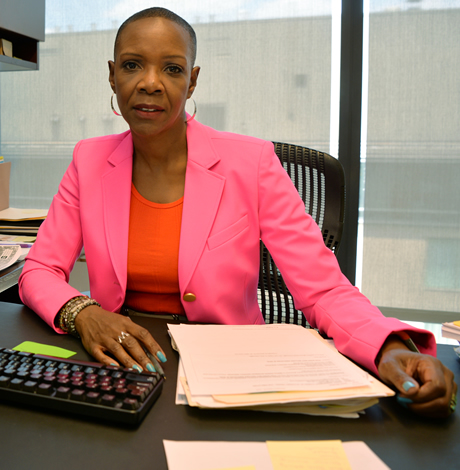
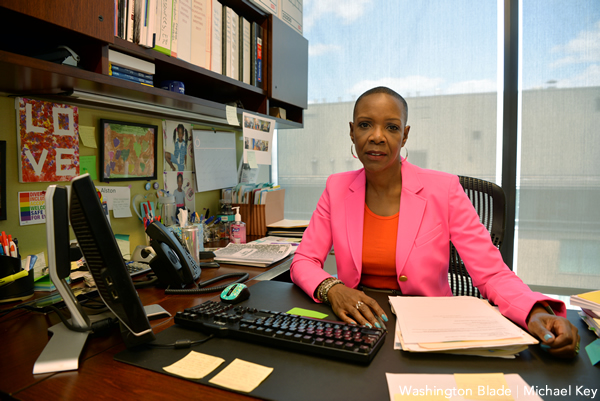
‘We are dealing with homeless youth that are isolated and rejected by the community,’ said June Crenshaw, executive director of the Wanda Alston Foundation.
This story is part of our contribution to the 2018 #DCHomelessCrisis news blitz. Local media outlets will be reporting and discussing stories about ending homelessness in the nation’s capital all day. The collaborative body of work is cataloged at dchomelesscrisis.press.
The first LGBT youth-focused shelter in D.C. is continuing its legacy of serving one of the most vulnerable demographics.
The Wanda Alston House and Foundation, now in its 10th year of service, serves LGBT individuals ages 16-24. The residential home-turned-shelter currently houses eight people, and hundreds have been through its doors over the last decade. The house is named after the late Wanda Alston, a D.C.-based LGBT activist who was murdered near her home in 2005.
Individuals enter the program based on their level of vulnerability and what kind of care the city’s homeless management providers think will best fit that person’s circumstances. The facility provides 24-hour support for residents through counseling, mental and medical health services. Tuition assistance and professional development is provided and other life skill services such as learning how to balance a checkbook, shop for groceries and manage a credit score are also offered. Residents receive three meals a day, clothing and toiletries as well as other necessities like Metro cards.
Full-time staff is trained, culturally competent and trauma-informed to ensure that all residents are supported. The operations manager and case manager work full-time at the house to make sure that everything runs smoothly and a clinical supervisor is also full-time to provide assessments and connect residents with the support they need.
The staff works together as an agency and as individuals to connect with the youths and help them cope, give support and help them navigate their lives. Sometimes that can be difficult and residents can respond by acting out.
“We are dealing with homeless youth that are isolated and rejected by the community,” says June Crenshaw, executive director of the Wanda Alston Foundation. “They’re forced to survive some unspeakable situations. Most, if not all, arrive having experienced some severe trauma. This can show up in less-than-positive ways like addiction, inability to cope with stress or not being able to navigate positive communication skills. But they’re human and they’ve had to endure circumstances that most of us couldn’t survive.”
Crenshaw, a self-identified “old-fashioned” lesbian and woman of color, says most youth in the program are women of color.
“When I started in this role two years ago, a resident came to me and said she never saw a person that looked like me in a leadership role. That stuck with me,” she says. “I’m proud to be a brown woman of the community that’s working hard to make things better.”
The program at the Wanda Alston House is slightly different from the programs at other LGBT shelters, she says. There are certain requirements that the residents must participate in that help them accomplish their personal goals within the 18-24 months they live there.
“We provide connections and care in all the ways that a person would need,” Crenshaw says.
After leaving the house, individuals stay connected to the care at the facility for 90 days-six months. Staff continues to support them however they need it — like buying groceries, clothes or Metro cards and finding housing and employment as well as providing case management to help them navigate other support and services available.
Crenshaw says there’s an “epidemic of LGBT homelessness.” Around 50 percent of the homeless youth in D.C. are LGBT-identifying. At the Wanda Alston House, residents “talk and share experiences around being treated differently, misgendered, disrespected, attacked and discriminated against.”
She says the city is committed to the youth but that in homeless centers that are not culturally sensitive to LGBT people, “grave mistreatments” can occur.
“Our population is trending as the most affected by homelessness and mental health issues,” she says. “We have a responsibility to do better by our youth, make sure they stay safe and are allowed to thrive. Facilities like ours are needed as long as these circumstances exist.”
The facility costs slightly over half a million dollars to run each year and most comes from local government offices such as the Mayor’s Office of LGBT Affairs. Grant dollars are used to run the shelter and pay staff, but that doesn’t cover all the expenses. They also rely on fundraising and the LGBT community and allies to support them. Donations amount to 25 percent of the budget.
Although D.C. has some of the most progressive laws in the nation and has been widely noted as one of the U.S. cities LGBT individuals can feel most open and supported, the competitive job market and high cost of living creates difficulties for LGBT people. LGBT people of color are more likely to be unemployed and represent a large portion of impoverished individuals and victims, Crenshaw says.
D.C. has the highest number per capita of LGBT individuals compared to other American cities. Crenshaw says not enough of the resources the city provides for homeless people are going to LGBT organizations and there is a lot of work yet to be done to resolve this epidemic.
The Wanda Alston House, however, has survived the turbulence of 10 years of operation and Crenshaw says they are ready and looking forward to at least another 10.
Books
Love or fear flying you’ll devour ‘Why Fly’
New book chronicles a lifetime obsession with aircraft

‘Why Fly’
By Caroline Paul
c. 2026, Bloomsbury
$27.99/256 pages
Tray table folded up.
Check. Your seat is in the upright position, the airflow above your head is just the way you like it, and you’re ready to go. The flight crew is making final preparations. The lights are off and the plane is backing up. All you need now is “Why Fly” by Caroline Paul, and buckle up.

When she was very young, Paul was “obsessed” with tales of adventure, devouring accounts written by men of their derring-do. The only female adventure-seeker she knew about then was Amelia Earhart; later, she learned of other adventuresome women, including aviatrix Bessie Coleman, and Paul was transfixed.
Time passed; Paul grew up to create a life of adventure all her own.
Then, the year her marriage started to fracture, she switched her obsession from general exploits to flight.
Specifically, Paul loves experimental aircraft, some of which, like her “trike,” can be made from a kit at home. Others, like Woodstock, her beloved yellow gyrocopter, are major purchases that operate under different FAA rules. All flying has rules, she says, even if it seems like it should be as freewheeling as the birds it mimics.
She loves the pre-flight checklist, which is pure anticipation as well as a series of safety measures; if only a relationship had the same ritual. Paul loves her hangar, as a place of comfort and for flight in all senses of the word. She enjoys thinking about historic tales of flying, going back before the Wright Brothers, and including a man who went aloft on a lawn chair via helium-filled weather balloons.
The mere idea that she can fly any time is like a gift to Paul.
She knows a lot of people are terrified of flying, but it’s near totally safe: generally, there’s a one in almost 14 million chance of perishing in a commercial airline disaster – although, to Paul’s embarrassment and her dismay, it’s possible that both the smallest planes and the grandest loves might crash.
If you’re a fan of flying, you know what to do here. If you fear it, pry your fingernails off the armrests, take a deep breath, and head to the shelves. “Why Fly” might help you change your mind.
It’s not just that author Caroline Paul enjoys being airborne, and she tells you. It’s not that she’s honest in her explanations of being in love and being aloft. It’s the meditative aura you’ll get as you’re reading this book that makes it so appealing, despite the sometimes technical information that may flummox you between the Zen-ness. It’s not overwhelming; it mixes well with the history Paul includes, biographies, the science, heartbreak, and exciting tales of adventure and risk, but it’s there. Readers and romantics who love the outdoors, can’t resist a good mountain, and crave activity won’t mind it, though, not at all.
If you own a plane – or want to – you’ll want this book, too. It’s a great waiting-at-the-airport tale, or a tuck-in-your-suitcase-for-later read. Find “Why Fly” and you’ll see that it’s an upright kind of book.
The Blade may receive commissions from qualifying purchases made via this post.
Theater
Out actor Kevin Cahoon on starring role in ‘Chez Joey’
Arena production adapted from Broadway classic ‘Pal Joey’

‘Chez Joey’
Through March 15
Arena Stage
1101 Sixth St., S.W.
Tickets start at $93
Arenastage.org
As Melvin Snyder in the new musical “Chez Joey,” out actor Kevin Cahoon plays a showbiz society columnist who goes by the name Mrs. Knickerbocker. He functions as a sort of liaison between café society and Chicago’s Black jazz scene circa 1940s. It’s a fun part replete with varied insights, music, and dance.
“Chez Joey” is adapted from the Broadway classic “Pal Joey” by Richard Rodgers and Lorenz Hart. It’s inspired by John O’Hara’s stories based on the exploits of a small-time nightclub singer published in The New Yorker.
A warm and humorous man, Cahoon loves his work. At just six, he began his career as a rodeo clown in Houston. He won the Star Search teen division at 13 singing songs like “Some People” from “Gypsy.” He studied theater at New York University and soon after graduating set to work playing sidekicks and comedic roles.
Over the years, Cahoon has played numerous queer parts in stage productions including “Hedwig and the Angry Inch,” “La Cage aux Folles,” “Rocky Horror” as well as Peanut in “Shucked,” and George the keyboardist in “The Wedding Singer,” “a sort of unicorn of its time,” says Cahoon.
Co-directed by Tony Goldwyn and the great Savion Glover, “Chez Joey” is a terrific and fun show filled with loads of talent. Its relevant new book is by Richard Lagravenese.
On a recent Monday off from work, Cahoon shared some thoughts on past and current happenings.
WASHINGTON BLADE: Is there a through line from Kevin, the six-year-old rodeo clown, to who we see now at Arena Stage?
KEVIN CAHOON: Anytime I want to land a joke in a theater piece it goes back to that rodeo clown. It doesn’t matter if it’s Arena’s intimate Kreeger Theatre or the big rodeo at the huge Houston Astrodome.
I was in the middle stadium and there was an announcer — a scene partner really. And we were doing a back and forth in hopes of getting laughs. At that young age I was trying to understand what it takes to get laughs. It’s all about timing. Every line.
BLADE: Originally, your part in “Chez Joey” Melvin was Melba who sings “Zip,” a clever woman reporter’s song. It was sort of a star feature, where they could just pop in a star in the run of “Pal Joey.”
CAHOON: That’s right. And in former versions it was played by Martha Plimpton and before her Elaine Stritch. For “Chez Joey,” we switched gender and storyline.
We attempted to do “Zip” up until two days before we had an audience at Arena. Unexpectedly they cut “Zip” and replaced it with a fun number called “I Like to Recognize the Tune,” a song more connected to the story.
BLADE: Wow. You must be a quick study.
CAHOON: Well, we’re working with a great band.
BLADE: You’ve played a lot of queer parts. Any thoughts on queer representation?
CAHOON: Oh yes, definitely. And I’ve been very lucky that I’ve had the chance to portray these characters and introduce them to the rest of the world. I feel honored.
After originating Edna, the hyena on Broadway in “The Lion King,” I left that to do “Hedwig and the Angry Inch” as standby for John Cameron Mitchell, doing one show a week for him.
Everyone thought I was crazy to leave the biggest musical of our time with a personal contract and getting paid more money that I’d ever made to get $400 a week at the downtown Jane Street Theatre in a dicey neighborhood.
At the time, I really felt like I was with cool kids. I guess I was. And I never regretted it.
BLADE: When you play new parts, do you create new backstories for the role?
CAHOON: Every single time! For Melvin, I suggested a line about chorus boys on Lakeshore Drive.
BLADE: What’s up next for Kevin Cahoon?
CAHOON: I’m about to do the New York Theatre Workshop Gala; I’ve been doing it for nine years in a row. It’s a huge job. I’ll also be producing the “Cats: The Jellicle Ball” opening on Broadway this spring; it’s a queer-centric uptown vogue ball with gay actor André de Shields reprising his role as “Old Deuteronomy.”
BLADE: There’s a huge amount of talent onstage in “Chez Joey.”
CAHOON: There is. I’m sharing a dressing room with Myles Frost who plays Joey. He won accolades for playing Michael Jackson on Broadway. We’ve become great friends. He’s a miracle to watch on stage. And Awa [Sal Secka], a D.C. local, is great. Every night the audience falls head over heels for her. When this show goes to New York, Awa will, no doubt, be a giant star.
BLADE: Do you think “Chez Joey” might be Broadway bound?
CAHOON: I have a good feeling it is. I’ve done shows out of town that have high hopes and pedigree, but don’t necessarily make it. “Chez Joey” is a small production, it’s funny, and audiences seem to love it.

The Capital Pride Alliance held the annual Pride Reveal event at The Schuyler at The Hamilton Hotel on Thursday, Feb. 26. The theme for this year’s Capital Pride was announced: “Exist. Resist. Have the audacity!”
(Washington Blade photos by Michael Key)























-

 India4 days ago
India4 days agoActivists push for better counting of transgender Indians in 2026 Census
-

 Advice4 days ago
Advice4 days agoDry January has isolated me from my friends
-

 District of Columbia4 days ago
District of Columbia4 days agoCapital Pride reveals 2026 theme
-

 National4 days ago
National4 days agoAfter layoffs at Advocate, parent company acquires ‘Them’ from Conde Nast

